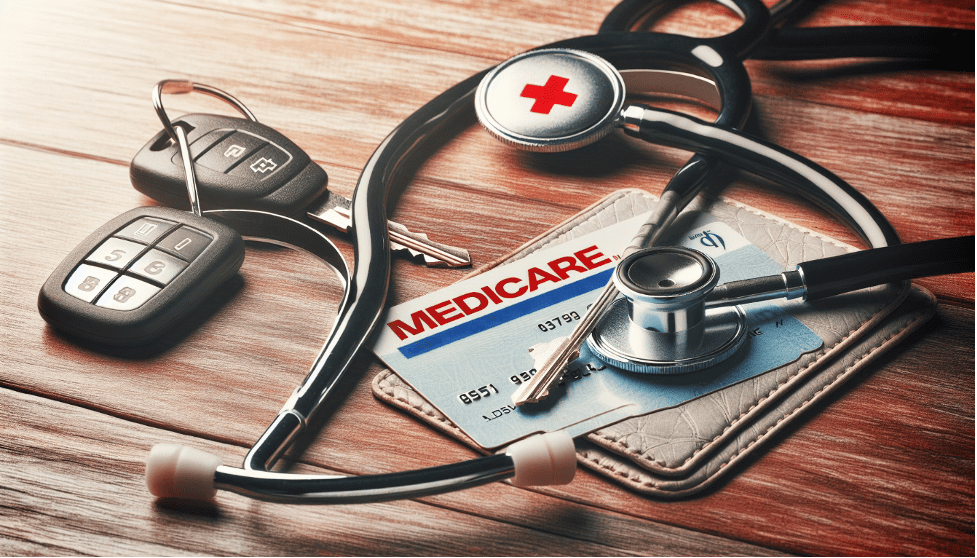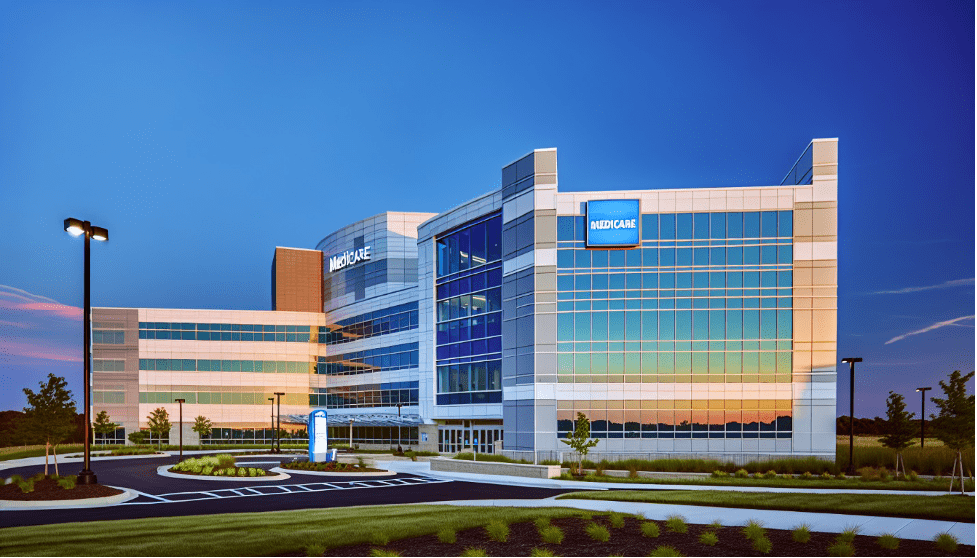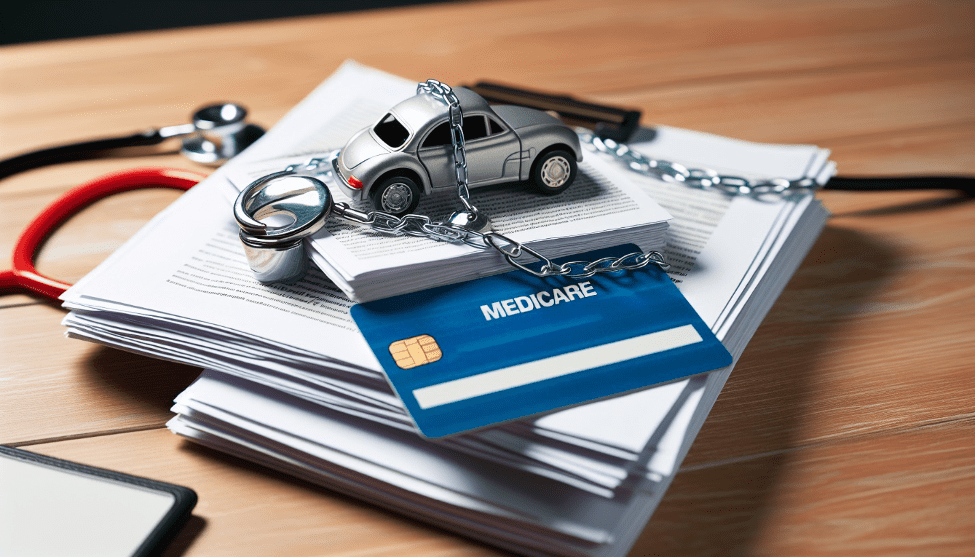Does Medicare Cover Car Accidents?
After a car accident, you may have questions about your medical coverage. Specifically, does Medicare cover car accidents? Medicare will likely cover costs associated with car accidents, but the coverage specifics depend on existing insurance and certain regulations.
This article delves into how Medicare works in the context of car accidents, providing clarity on coverage limitations and what you can expect as a Medicare beneficiary.
Key Takeaways
- Medicare usually serves as a secondary payer in car accident cases, covering costs not paid by auto insurance or no-fault/PIP insurance, with its role influenced by state-specific insurance laws and whether it’s a no-fault state.
- Medicare’s accident injury coverage is divided between Part A for inpatient services (e.g., hospital care, and nursing facility services) and Part B for outpatient services (e.g., doctor visits, therapies, diagnostics, and laboratory testing), with certain limitations on long-term care and rehabilitative service costs.
- Settlements from car accidents are likely subject to Medicare’s right to reclaim conditional payments for medical expenses made before the resolution of a claim, impacting the net settlement amount received by beneficiaries.
Compare Plans in One Step!
Enter Zip Code
Understanding Medicare's Role in Car Accident Cases
Medicare plays a vital role in covering medical expenses for auto accident injuries. Still, its involvement is shaped by various factors, including whether it serves as the primary or secondary payer.
More often than not, Medicare is considered a secondary payer to the auto insurance company when another driver is at fault. This means that the auto insurance company is primarily responsible for medical costs, with Medicare stepping in to cover any expenses not covered by the primary insurance.

However, no-fault insurance or mandatory Personal Injury Protection (PIP) coverage can influence Medicare’s role in car accident cases. In these instances, the no-fault or PIP insurance provisions are considered the primary payer for medical expenses, and Medicare can only cover expenses exceeding these policies’ limits.
Primary vs. Secondary Payer
In the world of insurance, the terms ‘primary’ and ‘secondary’ payer refer to the order of responsibility for payment of medical costs. In car accident cases, the car insurance is typically considered the primary payer, responsible for the initial payment of medical costs, while the Medicare plan serves as the secondary payer, providing coverage for expenses not covered by the primary insurance.
This hierarchy is usually influenced by factors such as the individual’s insurance type and employment status, with private insurance typically serving as the primary payer.
When Medicare serves as a secondary payer, reporting the case as part of the Medicare Secondary Payer (MSP) recovery process is essential. Medicare may then cover future Medicare-approved expenses required by the claimant, especially when primary payment is delayed or in dispute.
It is worth noting that in most cases, Medicare does not have the authority to claim the pain and suffering portion allocated within a settlement.
No-fault insurance and Personal Injury Protection (PIP)
No-fault insurance is a type of car insurance that mandates each driver’s insurance provides coverage for their injuries, irrespective of who was at fault in the accident. Similarly, PIP insurance may offer financial protection for medical bills and other accident-related expenses, regardless of fault. In both cases, these insurances will likely take precedence over Medicare as the primary payer.
Therefore, in states implementing no-fault insurance laws, Medicare may provide coverage for car accident-related injuries once the no-fault or PIP insurance has been exhausted. Essentially, in these situations, Medicare steps in as the secondary payer, only covering expenses that exceed the limits of the no-fault or PIP insurance.
Medicare Coverage for Car Accident Injuries: Part A & Part B
Medicare coverage for car accident injuries is generally split between Part A, which covers inpatient hospital care, and Part B, which should cover outpatient services and necessary medical equipment.

If you’re hospitalized due to the severity of your injuries, Medicare Part A typically covers eligible expenses such as hospitalization, nursing facility services, or hospice care. It may also cover emergency ambulance transportation if your injuries are confirmed to be serious.
On the other hand, Medicare Part B covers any medically necessary treatment recommended by a doctor for injuries sustained in a car accident. This may include:
- physical and occupational therapy
- lab tests
- x-rays
- ambulance services
and other essential services, including chiropractic services.
Inpatient Hospital Care and Services
If your car accident injuries require inpatient hospital care, Medicare Part A comes into play. It provides coverage for a range of services, typically including hospital stays, surgeries, and home healthcare. This coverage is usually utilized when an individual is hospitalized due to the severity of their injuries or when their treatment requires a prolonged hospitalization.
In addition to these services, Medicare Part A also includes coverage for:
- Hospital stays
- Skilled nursing facility care
- Hospice care
- Home health care
Medicare Part A may also include coverage for rehabilitative services, which can be crucial for recovery after a car accident. However, it’s important to be aware that Part A coverage is limited by the duration of hospital stay it covers, and additional co-payments may be required for prolonged hospital stays.
Outpatient Medical Services and Equipment
While Medicare Part A covers inpatient services, Part B is responsible for a range of outpatient services, including outpatient mental health care. After a car accident, this could include physical and occupational therapy to aid in your recovery, as well as essential services such as lab tests and x-rays.
Medicare Part B provides coverage for durable medical equipment (DME) essential for treating injuries sustained in a car accident. This may encompass items like:
- beds
- oxygen
- pumps
- canes
- crutches
- braces
These assistive devices can make a significant difference in your recovery process and quality of life following a car accident.
The Impact of State Laws on Medicare Coverage for Auto Accidents
Although Medicare establishes a national framework for health coverage, the interaction between Medicare and auto accidents can significantly vary based on state laws. In jurisdictions with no-fault insurance laws, for instance, these laws can influence Medicare’s coverage following a car accident.
Significant variations exist in how state laws impact Medicare coverage for auto accidents. Depending on the state and type of insurance coverage involved, Medicare’s role can differ.
Variation Between States
 Just as the healthcare systems and insurance regulations can vary dramatically across the country, so too can Medicare’s coverage for car accident injuries.
Just as the healthcare systems and insurance regulations can vary dramatically across the country, so too can Medicare’s coverage for car accident injuries.
It’s not a one-size-fits-all approach; instead, there are distinct rules and variations in coverage across specific states.
Take Michigan as an example. This state has unique Medicare regulations for auto accidents, offering possible lifetime unlimited benefits for auto accident injuries. This means that if you’re a Medicare recipient in Michigan who’s been in a car accident, your coverage situation could look significantly different than if you were in a different state.
Examples of State-Specific Coverage Scenarios
To understand the impact of state laws on Medicare coverage for auto accidents, it’s helpful to look at some specific examples. For instance, in Michigan, Medicare Part A may cover auto accident-related injuries under specific conditions, separate from No-Fault auto insurance. In Texas, Medicare Part B generally covers outpatient physical and occupational therapy for car accident injuries, up to the therapy cap limit.
On the other hand, in New York, No-Fault insurance can possibly handle medical treatments for car accident injuries, and Medicare collaborates with this insurance to cover the remaining expenses.
In both California and Florida, Medicare is likely to offer consistent coverage for injuries resulting from car accidents, ensuring that these injuries are treated similarly to those in any other state.
Coordinating Medicare Benefits with Auto Insurance Policies
When you’re involved in a car accident, one of the key challenges can be coordinating your Medicare benefits with your auto insurance policies. Navigating this process requires a clear understanding of the Medicare Secondary Payer law, which plays a crucial role in establishing the order of payment responsibility for car accident-related medical expenses.
To ensure benefits coordination, notifying the Benefits Coordination & Recovery Center (BCRC) about any conditional payments made by Medicare due to the car accident is a necessary step.
Unfortunately, this process can come with its fair share of challenges, including determining the primary and secondary payer, ensuring prompt payment by the primary policy, and effectively managing the cost of recovery efforts.
Navigating Coordination of Benefits
Successfully coordinating Medicare and auto insurance benefits involves a few key steps. First, you’ll need to identify the health benefits available to you as a Medicare beneficiary. Then you’ll need to coordinate the payment process, ensuring that claims are paid correctly and promptly.
However, this process isn’t always straightforward. There are several common pitfalls to avoid, including not signing up for Medicare at the right time, failing to understand the different types of Medicare, and neglecting to review your coverage. By avoiding these mistakes, you can ensure that you’re getting the most out of your Medicare benefits and auto insurance policies after a car accident.
Potential Pitfalls and Challenges
While coordinating Medicare benefits with auto insurance policies can seem straightforward in theory, it can often be fraught with potential pitfalls and challenges. For example, potential delays in payment and administrative complexities can make the process more difficult than it needs to be.

The presence of dual coverage can also complicate matters. In the context of car accidents, Medicare recipients are typically subject to a specific order of payment responsibilities, where the first payment is covered by either no-fault or liability insurance, and Medicare covers the second payment.
To minimize potential challenges, it’s beneficial to have a thorough understanding of Medicare’s secondary payment status, promptly report accidents to Medicare for reimbursement, and be aware of the 30-month coordination period for individuals with Medicare due to ESRD, during which COBRA coverage may take precedence.
Rehabilitation Services and Long-Term Care After a Car Accident
One of the critical aspects of recovery from a car accident is access to rehabilitation services and long-term care. Medicare usually provides coverage for inpatient rehabilitation services, including physical therapy, occupational therapy, and speech-language pathology.
Additionally, outpatient physical and occupational therapy for car accident injuries will likely be covered under Medicare Part B, up to a certain limit.

In the past Medicare established a review threshold of $2,110 for combined physical therapy and speech-language pathology services. Once this limit is reached, a review of the continued need for coverage may be initiated.
Physical, Occupational, and Speech-Language Therapy
After a car accident, physical, occupational, and speech-language therapy can be essential for helping you regain your strength and mobility. Medicare provides coverage for these therapy services, as long as they are considered medically necessary. This may include:
- Physical therapy under Medicare Part B
- Outpatient occupational therapy up to the therapy cap limit
- Speech therapy services under Medicare Parts A, B, or C.
However, it’s important to note that while Medicare does not impose a limit on the number of therapy sessions, there is a cap on the total amount it will cover for these services. For outpatient physical and occupational therapy, this cap is currently set at $2,110 (which may change in the future).
Long-Term Care Facilities and Home Health Care
In some cases, a car accident can result in injuries severe enough to require long-term care or home health services. Medicare Part B covers home health services such as at-home physical therapy, provided the individual meets the criteria for being homebound.
Medicare Part A also provides coverage for inpatient hospital stays, skilled nursing facility care, hospice care, and certain home health care services.
Unfortunately, Medicare does not provide coverage for long-term care facility expenses following a car accident. For nursing care, Medicare Part A may provide coverage when custodial care is not the sole type of care required by the patient. Understanding these coverage limitations is key to planning your recovery and ensuring you have the support you need after a car accident.
Medicare Liens and Car Accident Settlements
When you receive a settlement after a car accident, you might think that the financial side of things is finally resolved. However, if Medicare has made conditional payments for your medical expenses, it may have the right to recover these payments from your settlement. This is due to the ‘Medicare Secondary Payer’ rule, which mandates the recovery of these payments from any received compensation.

While Medicare does not have the authority to specifically claim the pain and suffering portion allocated within a settlement, it can assert a lien to ensure reimbursement for conditional payments it made for medical expenses. Understanding the impact of these Medicare liens on your settlement is crucial to navigating the aftermath of a car accident.
Conditional Payments and Reimbursement
Conditional payments are payments made by Medicare for services that another payer should have paid. In the context of a car accident, these could include payments for items or services related to the accident that Medicare has paid conditionally.
Upon receiving a settlement for your car accident, it becomes necessary to reimburse these conditional payments to Medicare. Failure to do so can result in penalties and could potentially impact your Medicare coverage. To initiate the reimbursement process, you’ll need to inform the Benefits Coordination & Recovery Center (BCRC).
This is a crucial step in ensuring that Medicare is appropriately compensated for any conditional payments it makes.
Impact on Pain and Suffering Compensation
Being involved in a car accident can have significant physical and emotional impacts, and compensation for pain and suffering can be a crucial part of your recovery. However, the presence of a Medicare lien can complicate the negotiation process for this compensation.
Medicare has the potential to decrease the eligible amount for damages and may lower the expected pain and suffering award in car accident cases. Nevertheless, it’s important to note that while Medicare can take a portion of a settlement, it typically does not claim the entire amount.
Being aware of these potential impacts can help you navigate the negotiation process and ensure you receive the compensation you deserve.
Summary
Navigating the intricacies of Medicare coverage after a car accident can be a daunting task. However, by understanding the roles of primary and secondary payers, the impact of state laws, and the coordination of benefits with auto insurance policies, you can better navigate the recovery process.
Remember, while Medicare provides a vital safety net, it’s not a one-size-fits-all solution. Each car accident case is unique, and understanding the nuances of your coverage can make all the difference in your recovery journey.
Frequently Asked Questions
→ What does Medicare cover after a car accident?
Medicare Part B should cover diagnostic tests, X-rays, ambulance services, and durable medical equipment related to car accident injuries, while Medicare Part A should cover hospitalization, surgery, rehabilitation, and other medical services.
→ What happens if a Medicare beneficiary is injured in an automobile accident?
If a Medicare beneficiary is injured in an automobile accident, Medicare Part B can cover medical services necessary for the treatment of the injuries, operating based on medical necessity. Additionally, Medicare is generally a secondary payer to liability insurance, including in cases of automobile accidents.
→ Does Medicare cover long-term care facility expenses following a car accident?
Based on their offerings in the past, Medicare does not cover long-term care facility expenses after a car accident.
→ What are conditional payments in the context of Medicare?
Conditional payments in the context of Medicare refer to payments made by Medicare for services that another payer should have covered, such as those related to a car accident.

ZRN Health & Financial Services, LLC, a Texas limited liability company
Russell Noga is the CEO of ZRN Health & Financial Services, and head content editor of several Medicare insurance online publications. He has over 15 years of experience as a licensed Medicare insurance broker helping Medicare beneficiaries learn about Medicare, Medicare Advantage Plans, Medigap insurance, and Medicare Part D prescription drug plans.



